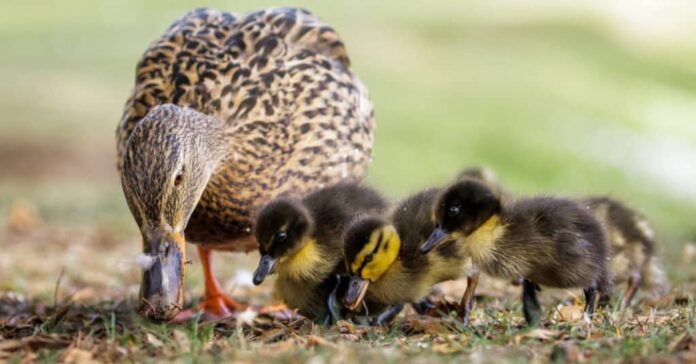Last Updated on November 11, 2023 by Fumipets
Ducks belong to the Anatidae family of birds, which also includes swans, geese, and seabirds like gannets. Ducks come in a variety of kinds that are raised for their meat, eggs, or even as pets. Most people have at some time in their life fed wild ducks, but did we do it properly?
Ducklings have an innate need to hunt for food from birth. Their diet is often referred to be omnivorous since they will consume everything they can find. Read on to find out more about ducks and their particular dietary requirements, whether you have a pet duck or are curious about how to feed the ducks at a pond close to you.
The Wild Duckling
Ducklings in the wild hatch from their eggs and remain close to their mother thereafter. She directs them to a spot where the ducklings may find food and water and be comfortable.
A young wild duck will consume practically everything, including worms, insects, plants, and algae. They could eat throughout the day if the weather is warm. They will need to be close to water as winter comes in colder locations because their food freezes up.
They consume a lot of grass and weeds in the summer as well, which might leave them excessively full and make it harder for them to digest food in the winter. As they start to consume different foods, their stomachs could not expand, which might be harmful.
Their diets alter as they become bigger, becoming more insect- and even small-fish-heavy.
Caring for a Pet Duckling
In order for your pet duck to grow up healthy and robust, you must feed them appropriately. Additionally, make sure your duck has access to lots of clean water so it may drink it every day.

What to Feed?
Take out your baby duck starting kit on the day they hatch out of the egg.
Duck meal pellets that are soft enough for their sensitive beaks to eat on are included in this package. A duck toy to play with and supplements like calcium pills are also available for your pond or water feature.
You should be able to start giving your duckling tiny insects and worms after a few weeks. If at all feasible, you may let them wander free in a secure area of your yard, or you can scatter food for them to discover.
Young ducks should constantly be watched while they are eating to prevent choking. In order to keep food from rotting, be sure to discard any leftovers after a few hours.
How Often to Feed?
Ducklings mature fully in a matter of months due to their rapid growth. Although certain varieties of newborn ducks develop more quickly than others, there is no such thing as too much food for baby ducks!
This is partly because they consume rapidly and search for more food as a result of their speedy digesting rates.
To ensure that your ducklings are developing as much as possible, you may give them a few worms or insects every day and fish at least twice a week.
It’s fine to let your ducklings self-feed, even if some people advise doing it every four hours or on demand. When you free-feed your ducklings, food is always accessible and they eat when their bodies tell them to.
Common Health Problems from Feeding
Your ducklings’ bills will increase in size if you feed them things like big fish bones or tiny pebbles that they can’t consume. They may find it agonizing and impossible to consume anything as a result.
They could eat stones from a pond’s bottom or gravel from your yard, which is another frequent problem. If this occurs, the stones would obstruct their digestive tracts, which will result in their death within hours if untreated.
Take your ducklings to the veterinarian right away to have their stomachs cleansed in saline solution if you gave them stones. By doing this, all of the pebbles and tiny rocks that are corroding their interiors will be removed.
Ducklings also need a balanced diet rich in several vitamins and minerals. Your ducklings may become weak and sluggish if they don’t get enough of either of these nutrients. They may not eat anything or be very exhausted.

Should You Feed Wild ducks?
The issue of whether or not you should feed wild ducks is one that causes a lot of uncertainty. There is a common misconception that feeding wild animals would make them reliant on people for sustenance and that ultimately the animals may become hostile and deadly.
Others maintain that feeding wild ducks is secure as long as you take care not to attract predators like hawks and foxes by scattering crumbs about.
In places like nature reserves, where the animals are secure from predators and have access to lots of water, it is seen to be relatively safe to feed ducks.
However, feeding wild ducks on a lake or pond might attract unwanted guests like geese and gulls. Other birds and animals may find it challenging to locate food as a result, placing them in danger of famine throughout the winter.
It is usually preferable to purchase organic food and carry fresh water in a pail when feeding wild ducks as opposed to just putting out kitchen scraps.
Conclusion
Ducks may be unusually wonderful pets. They are adorable birds who like human company and may significantly improve your quality of life. You may have a new best buddy for up to 20 years if you take good care of them! How you feed your duck will have the most impact on whether or not it grows to that age.
Particularly when they are hatchlings, be careful to provide a balanced diet that includes all the nutrients they need. Before introducing a new meal to your pet duck, always do your homework.
Check out other articles on this website blog to find out more information about these incredible creatures!


















